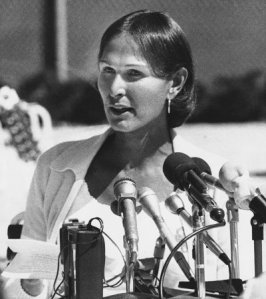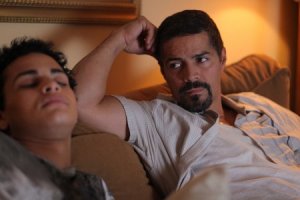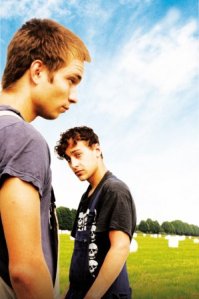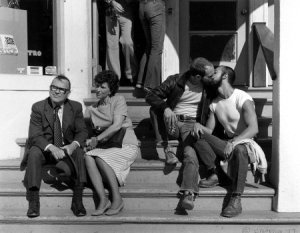May 25, 2011. Inside Out Festival. Renee, Lost in the Crowd, Gun Hill Road, Black Field, Harvest, We Were Here
Hi, this is Daniel Garber at the Movies, for culturalmining.com and CIUT 89.5 FM.
 Toronto Inside-Out festival is one of the world’s biggest LGBT film festivals, that shows movies and documentaries from around the world by and about lesbians, gays, bisexuals, and transsexuals. Or queers for short. The festival is continuing through this weekend, mainly at Toronto’s Light Box, and I hear there are still some tickets available, so now’s your chance to catch some of these very varied and interesting movies.
Toronto Inside-Out festival is one of the world’s biggest LGBT film festivals, that shows movies and documentaries from around the world by and about lesbians, gays, bisexuals, and transsexuals. Or queers for short. The festival is continuing through this weekend, mainly at Toronto’s Light Box, and I hear there are still some tickets available, so now’s your chance to catch some of these very varied and interesting movies.
So this week I’m going to look at a cross-section of movies and docs at this festival with a special emphasis on some good movies about the too often neglected “T” in LGBT. Next week: more on the “L” word.
Dir: Eric Drath
“I’m getting the message across that you can be a transsexual… and yet be a nice, normal, socially acceptable and productive member of society.” – Renee Richards.
Renee Richards was born as Richard Raskin, who grew up as an aggressive alpha male, served in the navy, became a tennis champ, a young man with dating prowess, a surgeon, a husband and a father.
But in the early seventies, after years of agonizing, and (after first chickening out on her first attempt, when she went to Morocco for sex-reassignment surgery) she took the plunge and became a woman. She named herself Renee (French for reborn) and started a new life. She became a sensation on the women’s tennis circuit until the past came out. She was ostracized, alienated by many tennis players, and splashed across the mass media.
They attempted to force Renee Richards to take a DNA test to prove her sex – this despite surgery, hormones, her day-to-day identity, clothes, body, voice and name. So she took them to court.
This is a very good, sympathetic documentary, that uses TV sports footage, home movies, newspaper articles and present- day interviews with family members, and famous tennis players (like Billie Jean King and Martina Navritolova). The most emotionally trying part of the documentary is about her difficult relationship with her son Rick.
Dir: Susi Graf
…is another documentary, also touching on problems faced by transsexuals and others. But if Renee is about rich and famous celebrities, Lost in the Crowd is about the other side of things. It’s about Queer youth who migrate to new York City to escape homophobia and other dangers in their hometowns, only to find themselves penniless, homeless and alone on the streets of Manhattan. It shows a few of these kids and young adults, many latina, and gay or trans, who seek shelter but end up in prison, on the streets, or dead.
While a very important issue, I was a bit disappointed by the movie, since it mainly just showed the victimization of the runaways by drugs, prostitution, and crime. It didn’t really offer any new viewpoint on the standard risks that face all runaways. One exception were the scenes shot in a prison, where one person (who had been arrested for low-level drug dealing) said he felt more free in the jail than he had in his midwestern small town.
Much more moving was a fictionalized drama about many of the same issues, a movie called
Dir: Rasheed Ernesto Green
This tells about Enrique, and ex-con out on parole going back home. He’s an ultra-macho Puerto Rican-American who was known for attacking any “maricon” in prison who might have looked at him the wrong way. What’s a few months of solitary if he’s defending his own masculinity? He arrives back with his street corner pals to see his much missed son Michael (Harmony Santana). But something about Michael has changed.
He’s living his life as a girl in school, but like a boy at home. He hangs out with his friends at school but faces widespread bullying in the hallways. As pretty and strong Vanessa, she meets a boyfriend at a poetry slam, but he’s less friendly once he discovers Vanessa is a pre-op transsexual. He doesn’t want to see her as a boy – she has to cover up anything that might turn him off. But Michaels’s father doesn’t want to see his son as in any way feminine. He attacks him with a scissors and hacks off his long hair.
Gun Hill Road is a good, moving drama of the trials and tribulations of being trans in a public school, and how both a father and a son have to learn how to understand each other. The actor playing Vanessa/Michael is excellent, and you feel for all the characters. And it has a great latino hiphop soundtrack.
Black Field
Dir: Vardis Marinakis
In the middle ages, at its height, the Ottoman empire used a special unit in their military known as the Janissaries. This was a division consisting entirely of paid, trained soldiers who were also slaves. They had no outside friends or families because they were kidnapped as small boys from outlying villages in the Balkans. Eventually, they converted to Islam and enlisted in this all-male, elite part of the army — the Janissaries. In this movie, a wounded janissary (Hristos Passalis) is found outside a Christian convent in a remote, mountainous region of Greece. The black-hooded nuns take him in, chain him up, while they tend to his wounds. A young nun, Anthi is sent to heal him, but there she makes a surprising discovery — his genitals are like hers. She is actually a boy, who had been taken in as an infant and raised there, so that the Mother Superior could save him from being kidnapped and made into… a janissary!
height, the Ottoman empire used a special unit in their military known as the Janissaries. This was a division consisting entirely of paid, trained soldiers who were also slaves. They had no outside friends or families because they were kidnapped as small boys from outlying villages in the Balkans. Eventually, they converted to Islam and enlisted in this all-male, elite part of the army — the Janissaries. In this movie, a wounded janissary (Hristos Passalis) is found outside a Christian convent in a remote, mountainous region of Greece. The black-hooded nuns take him in, chain him up, while they tend to his wounds. A young nun, Anthi is sent to heal him, but there she makes a surprising discovery — his genitals are like hers. She is actually a boy, who had been taken in as an infant and raised there, so that the Mother Superior could save him from being kidnapped and made into… a janissary!
 The movie follows – literally follows, the camera holds back behind the two as they walk through the lush forest, a green-covered swamp, and a dark rocky area – the tough, mean, AWOL soldier and the timid, whispering nun, as he forces the newly discovered boy to reclaim his male identity, and eventually become his partner. To make matters even more ambiguous, the boy who was raised as a girl is played by a very good actress (Sofia Georgovassili). It’s a slow-paced, challenging, sometimes violent, and at other times sensuous and exquisitely beautiful, first film. Very interesting to watch and should be seen on the big screen.
The movie follows – literally follows, the camera holds back behind the two as they walk through the lush forest, a green-covered swamp, and a dark rocky area – the tough, mean, AWOL soldier and the timid, whispering nun, as he forces the newly discovered boy to reclaim his male identity, and eventually become his partner. To make matters even more ambiguous, the boy who was raised as a girl is played by a very good actress (Sofia Georgovassili). It’s a slow-paced, challenging, sometimes violent, and at other times sensuous and exquisitely beautiful, first film. Very interesting to watch and should be seen on the big screen.
Dir: Benjamin Cantu
Marco is a young man who lives and works at an internship program on what used to be an East German communal farm. He wears overalls and a T-Shirt as he sorts carrots, bales hay, and clips the ears off cattle, along with the other interns. But he’s resisting committing himself to a lifetime of farm work. He doesn’t want to write the exam he has to take, mainly because he can’t write well. And he’s a bit of a loner – he won’t go out drinking with the other trainees, and they tease him for it.
But he enters into a silent friendship with a newby, Jacob. Things start to heat up in an abandoned old car (a Trabant?) and they realize they have something in common when Jacob finds the keys and drives them both into Berlin for an evening.
Harvest is another one of these hyper-realistic films – made on real locations, usually with non-actors, without a complicated plots, and often without a written script. There aren’t that many lines in this movie, and the budding relationship between Marco and Jacob is never really talked about – it just happens. But you totally understand and identify with all the characters, and the farm footage is fantastic – I’d never actually seen an enormous carrot-sorting mill. Harvetst is a very good, understated, realistic drama.
Dir: David Weissman
This is a documentary about San Francisco from the late 70’s until the early nineties. That was the period when the city was transformed from a gay mecca into the epicentre of a worldwide epidemic. I’m speaking about AIDS and HIV, then called the gay plague for the sudden, massive death toll of that community.
This movie is heart-wrenchingly moving because of the way it was made. They found a handful of people who lived there at that time and were somehow involved in that disaster, to tell the story of themselves and their friends directly to the camera.
The movie shows the face of one speaker’s friend and then close-ups, ten days later. So happily galavanting at a Castro street party one day, and then, suddenly, the same man infected with Karposi Sarcoma (cancerous, but painless black spots on the skin) and then, a few days after that, just dropping dead.
No one knew what was going on or what to do about it. Panic set in. The movie shows the quick progression of events — the protests, the medical advances, the set-backs — all told through the eyes of real, sympathetic men and women.
This is a very important, living oral history, illustrated by ample newspaper clips, snapshots and still photos.
These movies and more are part of Inside-Out, continuing on this weekend: you can check times atinsideout.ca . Also opening is the terrific documentary Bobby Fischer against the World, and the Canadian low-budget spooky, post-apocalyptic horror thriller The Collapsed, both of which I reviewed last week, and Little White Lies, a very funny, if long, French social comedy about the secrets and conflicts of a group of friends who vacation together; I reviewed that last year.
This is Daniel Garber at the Movies for CIUT 89.5 FM, and on my web site, Cultural Mining dot com.





leave a comment